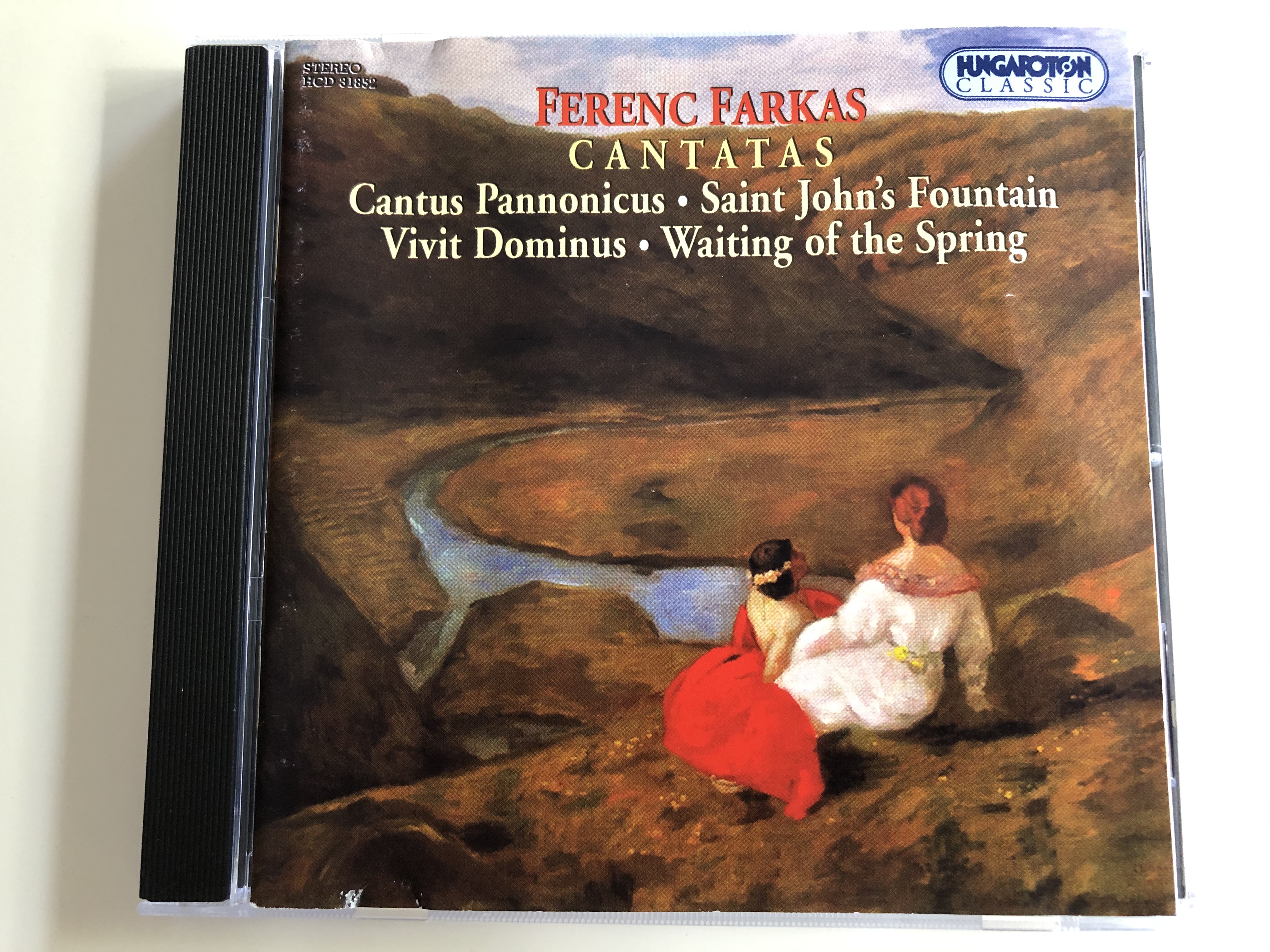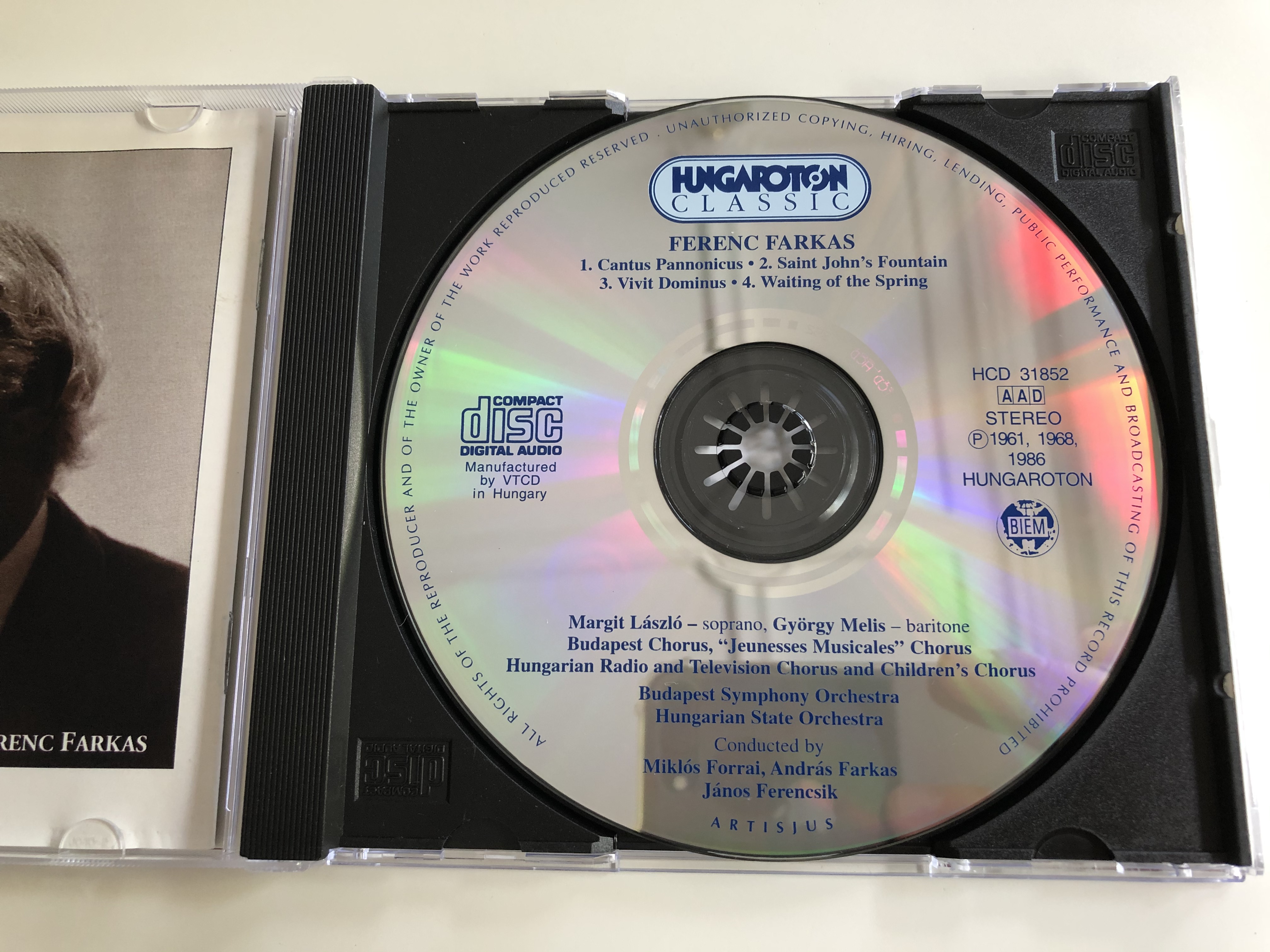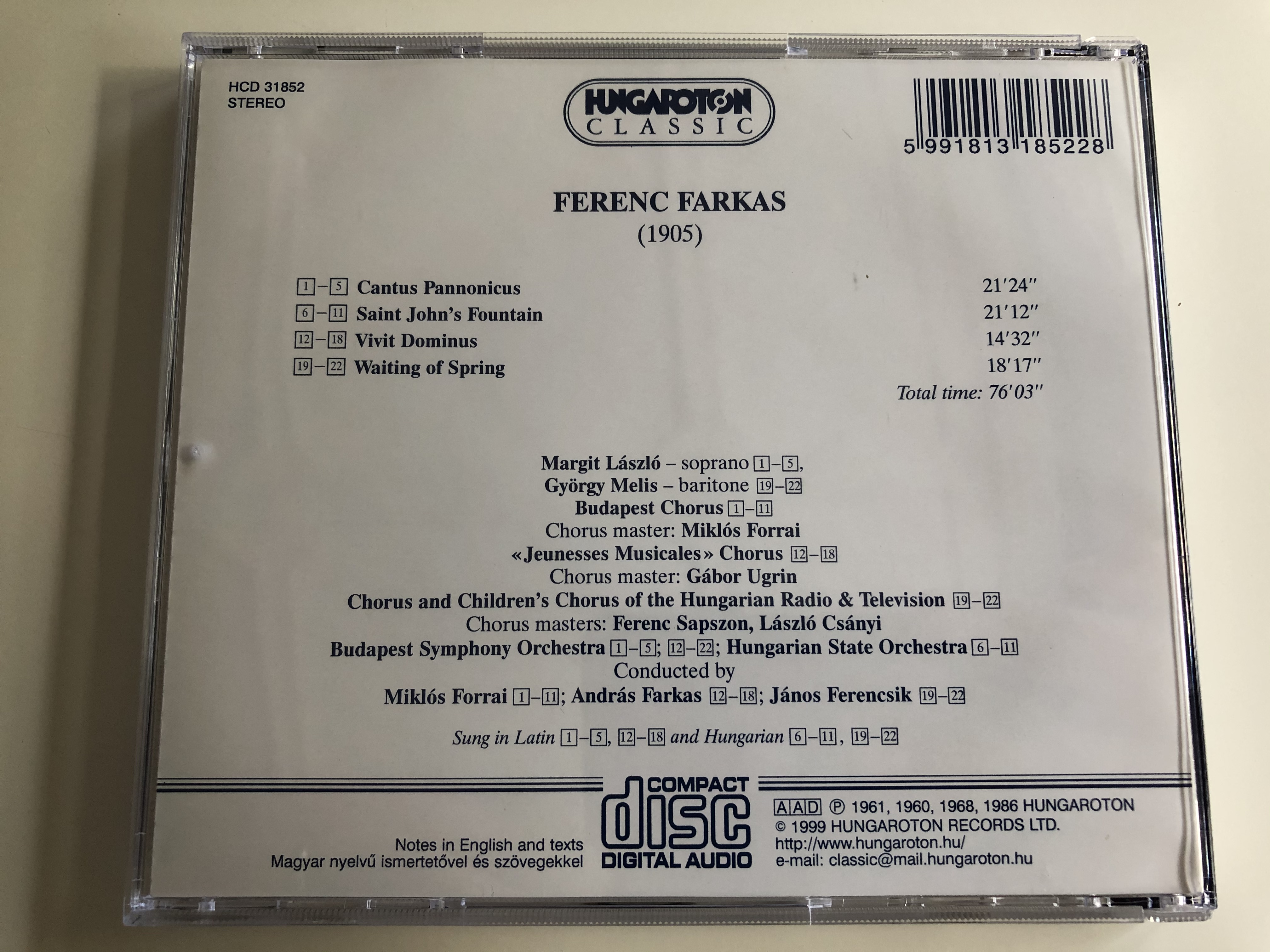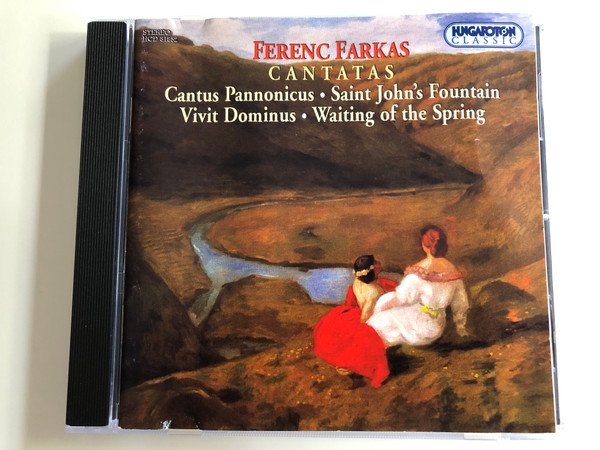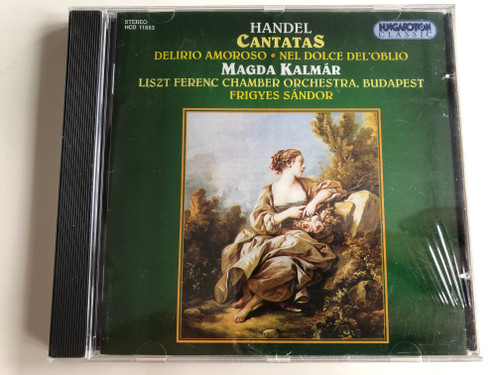Product Overview
Ferenc Farkas - Cantatas / Cantus Pannonicus, Saint John's Fountain, Vivit Dominus, Waiting of the Spring / Hungaroton Classic Audio CD 1999 Stereo
Farkas Ferenc: Kantáták
HCD31852
UPC 5991813185228
!!! Condition of this CD is USED VERY GOOD !!! We also have BRAND NEW ONE for $24.99!!!
Cantus Pannonicus, cantata for soprano solo, mixed choir and orchestra, text in Latin by Janus Pannonius (1959)
Budapest Kórus (Budapest Chorus) / Jeunesses Musicales / Magyar Rádió Énekkara (Hungarian Radio Choir) / Magyar Rádió Gyermekkórusa (Hungarian Radio Children´s Choi) / Magyar Rádió Szimfonikus Zenekara (Hungarian Radio Symphony Orchestra) / Nemzeti Filharmonikus Zenekar (National Philharmonic Orchestra) / Farkas András / Ferencsik János / Forrai Miklós / László Margit / Melis György
Tracklist:
Cantus Pannonicus — Cantata ex carminibus Jani Pannoni (1959)
[1] I. Moderato. Laus Pannoniae 2:25
[2] II. Andante, guasi una serenata. De Agnete 2:18
[3] III. Allegro vivace. Abiens valere iubet sanctos reges Varadini 6:11
[4] IV. Andante moderato. De amyedalo in Pannonia nata 3:41
[5] V. Moderato pesante., guasi marcia funebre
Ad martem precatio pro pace
Szent János kútja / Saint John's Fountain (1945—46)
lírikus kantáta / a lyric cantata
[6] I. Andante 2:26
[7] II. Adagio (Emléke visszacsillog ) 2:01
[8] III. Allegro moderato (Élünk szép Violámmal) 1:51
[9] IV. Lento (Elszállt szerelem illatától) 6:00
[10] V. Allegro 6:17
[11] VI. Adagio ( Szép a világ, gyönyörű a világ) 1:37
Vivit Dominus (1981-82)
Psalmus Davidis XVII. per coro misto ed orchestra
[12] I. Moderato. 2:22
[13] II. Moderato molto 2:24
[14] III. Allegro agitato 1:24
[15] IV. Allegro leggero 2:12
[16] V. Tranguillo meno mosso 1:30
[17] VI. 1:42
[18] VII. Piü mosso. Allegro vivace 2:58
Tavaszvárás — kantáta / Waiting of Spring — cantata (1967)
[19] I. Modarato — Andante (...invokáció / ...invocation ) 5:58
[20] II. Allegro molto (...lírikus intermezzo / ...[yrical intermezzo ) 3:43
[21] III. Scherzo (...guasi scherzo / ...guasi scherzo ) 2:30
[22] IV. Allegro (...epilógus / ...epilogue) 6:04
- Soprano - Margit László
- Baritone - György Melis
- Choir - Budapest Chorus, «Jeunesses Musicales» Chorus, Chorus and Children’s Chorus of the Hungarian Radio & Television
- Chorus master - Miklés Forrai, Gabor Ugrin, Ferenc Sapszon, László Csányi
- Orchestra - Budapest Symphony Orchestra, Hungarian State Orchestra
- Conducted by - Miklós Forrai, András Farkas, János Ferencsik
Ferenc Farkas (Hungarian pronunciation: [ˈfɛrɛnt͡s ˈfɒrkɒʃ]; 15 December 1905 – 10 October 2000) was a Hungarian composer.
Born into a musical family (his father played the cimbalom and his mother played the piano) in Nagykanizsa, Farkas began his musical studies in Budapest, at the Protestant Gymnasium (Grammar School) and later attended the Music Academy, where he studied composition with Leó Weiner and Albert Siklós.
After his graduation in 1927, he worked as a repetiteur and conductor at the Municipal Theatre of Budapest and collaborated with the Diaghilev Ballet. From 1929 to 1931, he attended Ottorino Respighi's masterclass at the Accademia Nazionale di Santa Cecilia in Rome. The years he spent in Rome had a decisive influence on him. He became acquainted with Italian and Mediterranean culture to which he felt a deep attraction. About this he said: "My principal aim has always been to attain for myself a latin clarity and proportion.".[1]
Farkas returned to Budapest in the autumn of 1931. As he could not find any other assignments, he played the piano in various theatre orchestras. In 1932 he met the director Paul Fejos for whom he composed several film scores, first in Hungary, then in Vienna and Copenhagen. This collaboration was to be for Farkas the beginning of an impressive series of “applied” music (music for around 75 films and 44 theatre plays and radio plays).
In the spring of 1934 he conducted research of his own into traditional Hungarian music by collecting folk songs in Somogy County: "When I got back from my travels abroad, it became clear to me that the work and research of Bartók and Kodály raised crucial problems that we as Hungarians, had to resolve ourselves. ".
From 1935 he taught at the Budapest City Music School. From 1941-44 he was professor of composition and director at the Conservatory of Kolozsvàr (today Cluj-Napoca in Romania) and he conducted the city's Opera Chorus. At the end of 1944, because of the war, he had to go back to Hungary. During the siege of Budapest, he worked as the deputy conductor of the Opera Chorus.
In 1946, he was sent to Székesfehérvár where he founded and managed the Conservatory. He was nominated professor of composition at the Franz Liszt Music Academy of Budapest in 1949, a post he held until his retirement in 1975. As a professor he was to have his greatest influence in the second half of the century. Among his students were: György Kurtág, György Ligeti, and Miklós Kocsár.
